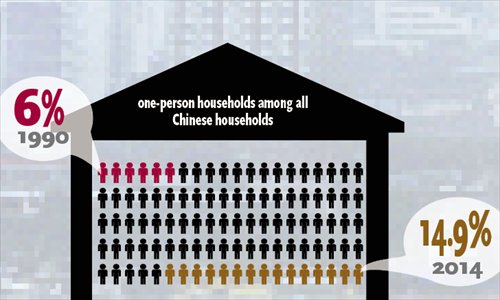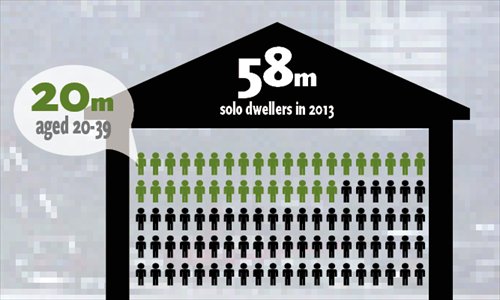China’s millenials relish freedoms of unmarried life despite singledom stigma
As more and more people leave their hometowns for work the number of people living alone in China has reached 58 million. Hundreds of thousands of well-educated young people in China's metropolises have chosen to live alone. But though they enjoy the relative freedom from the prying eyes of their family members, coping with loneliness and distancing themselves from traditional Chinese ways of life can be a hard lesson to learn.

A woman stands in the rain in Chongqing on Valentine's Day on February 14, 2014. Photo: CFP
It was 2 o'clock in the morning, and Lu Wei couldn't help weeping as she looked at the messy apartment into which she had just moved.
This is Lu's fifth year in Shanghai, and the fifth year she's been living alone. The 25-year-old white-collar worker thought she had gotten used to a life of solitude: she goes to work alone, watches films alone, jogs alone and travels alone.
But spending the past week moving into her new apartment, and dealing with real estate agents, her landlord, home decorators and movers, all by herself, showed her she isn't as used to it as she thought. Fatigue and stress prompted her to ask herself for the first time in five years: how is she going to cope, all by herself?
While in the US, it's common for young people to move out of their parents' homes after they reach adulthood and live by themselves before they get married, this is a relatively new trend in China. Living together with one's family is highly valued in Chinese tradition. Just twenty years ago, most young Chinese would live with their parents until they were married. But now, more and more people are choosing to live alone, as migration boomed in the past three decades.
This growing trend is supported by statistics: in 1990, 6 percent of Chinese households had only one person. By 2014, that number had more than doubled to 14.9 percent, according to China Statistical Yearbook, published by the National Bureau of Statistics. By 2013, over 58 million people live by themselves in China. 20 million of them are aged between 20 and 39.
The wealthier part of the country has seen more of the trend. In Shanghai, a fourth of households have only one person. In Beijing, that percentage is one fifth.
Social isolation is not unique to China. Nor is growing dependence on digital technology. But as most of China's young people have parents who lived in an age of collectivist conformity, living alone and learning to cope with loneliness has become a lesson that single youngsters in China's metropolises have to learn.

A man rests in his room in a community for single people in Guangzhou, Guangdong Province. Photo: CFP
Choosing isolation
While many people that live alone are low-skilled workers who have no choice but to live in relatively poor conditions in big cities, the number of well-educated and well-off singletons who choose isolation is on the rise.
Lu, for example, says she enjoys solitude most of the time. In her five years in Shanghai, she went to the cinema over 300 times, but only went with someone else three times. She watched many films multiple times: Wong Kar-wai's The Grandmaster five times, and Gravity and Life of Pi twice each. "It's easier to be immersed in a film if you watch it by yourself," she told Southern Weekly.
Lu also finds that she can now do things more attentively and live a lifestyle that she likes. She has plenty of personal time to make crafts by hand and send them to friends as gifts. She also has a notebook which records all her thoughts when she travels alone, things that she doesn't want to bother sharing with others.
Lu said she chose her career according to her parents' wishes. "So only in my everyday life can I truly follow my heart," she said.
However, one may find the individuality in mega-cities rather surreal, considering tolerance of alternative lifestyles is virtually nonexistent in most parts of the country. The singles can enjoy their own company without unwarranted intrusion into their private lives as long as they stay in the bubble of big cities, but this privacy is so fragile that it only takes a family reunion or a visit back to hometown to prick the bubble.
For many, the stress of complicated relationships returns during Spring Festival, the time of the year for family reunion.
"Every year before the Spring Festival I feel a sense of anxiety, because I know when I go back home to that familiar environment, my family will interrogate me about when I will find myself a boyfriend and get married," Clare Sun (pseudonym), a 28-year-old woman in Beijing, told the Global Times.
Sun comes from a city in East China's Shandong Province. Shandong, the place where Confucius was born, is known to be more conservative and traditional values still hold sway. Sun said she feel an obvious stigma when she visits other relatives' homes and they ask her about her marital status. Returning to her 25-square-meter apartment in Beijing offers her a sense of relief.


Living paradox
But there is a price to pay for the freedom, and eating alone is one of them. Chinese family life revolves around the dinner table, and Chinese people are used to big meals. According to tradition, a decent dinner should consist of at least four dishes and a soup. While this is way too much for the singletons, many feel the experience of eating alone difficult to bear.
To help single people eat better, Cai Yani, a former journalist from Shanghai, launched a video series called "Eating alone" in 2013, teaching people how to cook simple but delicate meals. Shot beautifully in high definition, each video shows a well-presented dish made by a well-dressed young man or woman in the setting of a modern house. The videos are played in Shanghai's taxis and broadcasted online. Through her project, she wants to prove that one can eat well even if one is alone.
Cai lives alone. "Before I was 30, my parents often interrogated me when I would get married, but after 30, they just stopped asking. On the one hand they were older and more concerned about themselves. On the other hand they started to believe that I can live well by myself," she told Southern Weekly magazine.
This is probably why being single has become a paradox in China. On the one hand, single men and women, who are labeled as "single dogs" and "leftover women," use self-mockery and jokes to overcome their embarrassment. Books like Longterm Singletons Will Be Killed and How to Marry a Man After You're 25 become best-sellers among the young. On the other hand, people like Cai glamorize solo life and singleness, making people believe that they have every reason to remain single: they can live better.

The singles economy
The growing number of solo dwellers has also boosted the singles economy, with real estate companies selling 15-square-meter apartments and companies launching mini washing machines and refrigerators. Convenience stores such as Lawson and FamilyMart, which were introduced to China from Japan in the 1990s, mushroomed on the streets in Shanghai, largely serving a youthful working clientele who find it time-saving to grab a quick meal in the narrow stores. By the end of 2014, there were 6,000 convenience stores in Shanghai.
One of the companies that is tapping the solo dweller market is the YouPlus International Youth Community. YouPlus transformed an old Colgate factory in Guangzhou, South China's Guangdong Province into an open, airy and well-lit space, oozing the atmosphere of a start-up company. Like many apartments tailored for solo dwellers, each apartment is about 20 square-meters in size and costs about 2,000 yuan a month, but what's different about YouPlus is the large communal space in each building. The founder of YouPlus, Liu Yang, hoped to build a platform for young people with similar passions to mingle and create their own communities.
According to a research by Ziroom, another real estate service targeted at solo dwellers, in 2015 over 60 percent of its residents were aged between 25 and 35, 60 percent have lived or studied overseas, and 30 percent work in IT. They are "independent, open-minded, and have their own lifestyles and life philosophies."
Although they all live alone, YouPlus hopes to gather them together and help them rebuild the kind of friendly community which sounds distant in an age when most people don't know their neighbors. To pull this off, the company has a rule that people over 45 years old, married couples, parents and people who do not like to make friends are not allowed to rent its apartments, although the rule is not strictly followed in reality.
YouPlus' model has attracted advocates. "Every day when I pass by the dining table in the living room and see these young people there, I felt like I'm part of a group, and that's awesome," said Liu Hui, a YouPlus resident. Today, nearly 10,000 people live in YouPlus' 11 buildings across China.
Newspaper headline: Solo in the Metropolis